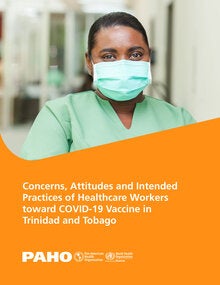Vaccination is one of the most important and effective tools in protecting populations from infectious diseases of public health concern. This includes using vaccines to prevent the spread of COVID-19, but some Health Care Workers (HCWs) are hesitant toward the effectiveness and safety of these vaccines and may delay or even refuse to get vaccinated when offered. In this survey, the intention of the HCWs in Trinidad and Tobago to get the COVID-19 vaccine was demonstrated by 74% of the respondents wanted to get the vaccine as soon as possible, whereas 26% expressed vaccine hesitancy. Nurses were hesitant at more than four times the rate of physicians. The youngest age group (22–31 years) was twice as hesitant as the oldest (51–81 years), and females were more than 1.5 times as hesitant than their male colleagues. When comparing the findings from Trinidad and Tobago to those from the entire Caribbean survey, there are similar findings in the data for the entire Caribbean, including Trinidad and Tobago, whereby it was observed that nurses were twice as hesitant as compared to physicians, and the younger HCWs were more hesitant than the older ones, although the difference between sexes is not as big for the Caribbean. Efforts need to be made to increase risk perception of COVID-19 disease versus all approved vaccines, so that HCWs feel more confident not only getting vaccinated themselves but also in recommending that their patients, family, and friends get vaccinated as well. Messaging also needs to emphasize the importance of taking the first vaccine that is available and not delaying vaccination in the hope of receiving a vaccine of personal preference. Trusted technical spokespersons should be used to empathetically communicate critical messages about vaccine safety and efficacy and the importance of getting vaccinated with the first vaccine that is offered.
|

